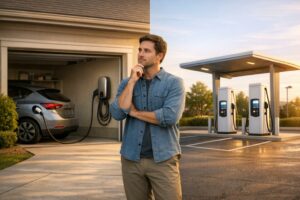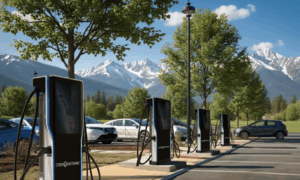
Home / EV Charging News / Electric Cars and Off-Grid Living: Exploring the Potential of EVs as Mobile Power Sources
Living off the grid or in remote areas presents unique challenges, especially when it comes to accessing reliable sources of power. Traditional energy infrastructure may not be readily available, making it essential for individuals to seek alternative solutions. In recent years, electric vehicles (EVs) have emerged as more than just eco-friendly transportation options – they also hold promise as mobile power sources, offering a sustainable solution to off-grid energy needs.
Living off the grid entails disconnecting from public utility services, such as electricity and water supply. While this lifestyle choice offers increased self-sufficiency and a reduced environmental footprint, it also demands creative approaches to fulfilling basic needs like electricity. In such scenarios, renewable energy sources like solar panels, wind turbines, and hydropower become indispensable.
Electric vehicles have gained significant traction as a cleaner and more sustainable mode of transportation. However, the innovation surrounding EVs doesn’t stop at emission-free mobility. Manufacturers and researchers are exploring ways to harness the potential of EVs as energy storage units and mobile power generators.
Electric cars are equipped with high-capacity batteries designed to store energy for propulsion. These batteries can also be leveraged to power homes and facilities. By employing vehicle-to-grid (V2G) technology, EVs can transfer stored electricity back to the grid or supply power to off-grid systems. This technology essentially turns EVs into portable energy storage units.
Several initiatives have already demonstrated the potential of using EVs for off-grid power:
Electric vehicles are no longer confined to the roads; they’re transforming into versatile energy solutions with the potential to revolutionize off-grid living. By leveraging their battery capacities and innovative technologies like V2G, individuals in remote areas can achieve energy independence while contributing to a cleaner, more sustainable future. As technology continues to evolve, the marriage of EVs and off-grid living is poised to become a cornerstone of modern energy strategies.



